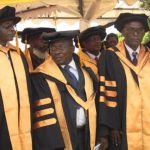Bachelor of Arts in Population and Development (BA PD)
The Bachelor of Arts in Population and Development aims at equipping graduate students with demographic, Social, economic and geographic analytical tools and their applications in resource in planning and use for sustainable development. At the end of the programme, learners will be expected to have acquired competences in determining the relationship between population and other broad parameters, such as internal and international immigration, poverty, environment and global warning which are essential for development planning. The programme is designed to produce competent professionals in demography, population and development planning.
Programme Summary
Programme Informations
Two principal passes in the following subjects: History, Geography, Kiswahili, English Language, French, Arabic, Fine Arts, Economics, Commerce, Accountancy, Physics, Chemistry, Biology, Advanced Mathematics, Agriculture, Computer Science.
BA (PD) consists of 16 core courses and 4 electives. Each course (core and elective) has a 2 units’ weight. In addition, there are 2 compulsory cross cutting courses on offer (computer and communication skills) each with a1-unit weight.
This shall be made of all core courses in each level whereby at each level a student shall be required to accomplish a minimum of 12 units. For example in level 1 and level 2, students will be required to undertake all courses as indicated in this Handbook. In level 3 students shall be required to accomplish all the 7 core courses which make 14 units and select a minimum of 2 elective courses.
Programme Organization
Level 1 (All Courses)
| Course Codes | Course Title |
| OPD 101 | Introduction to Population Studies |
| OPD 102 | Introduction to Family Life Education |
| OPD 103 | Introduction to Reproductive Health and Sexual Health |
| OPD 104 | Medical Geography |
| OCP 100 | Introduction to Computer |
| OFC 017 | Communication Skills |
| One elective course | |
| Total |
Level 2 (All Courses)
| Course Code | Course Title |
| OPD 201 | Dynamics of Population Structure |
| OPD 202 | Gender and Development |
| OPD 203 | Basic Demographic Methods |
| OEC 124 | Social Science Research Method |
| OPD 209 | Field Practical |
| Total |
Level 3 (Seven Core Courses and at Least One Elective)
| Course Code | Course Title |
| OPD 301 | Gender, Health and Family Planning |
| OPD 302 | GIS and Population Studies |
| OPD 303 | Population, Policy and Development |
| OPD 304 | Population, Migration and Development |
| OPD 305 | Family Resources Management |
| OPD 306 | Urban Systems, Planning and Management* |
| OPD 307 | Population, Environment and Development |
| OPD 308 | Nutrition for Health* |
| OPD 309 | African Environment and Development* |
| OPD 310 | Rural Settlement and Development |
| ODS 101A | Concepts and Theories of Social Development* |
| Total |
Elective courses
OGE 229: Geography Field Practical’s
There are two Geography Field Practical’s (GFP I and GFP II) to be done by all second and third year students taking Geography. The 2 GFPs will carry 2 units. The aim of conducting Field Practical’s is to enable student to match and concretize theory and application of geographical knowledge in the Field. Geography Field Practical’s are deliberately decentralized into geographical zones. It is intended to bring the Practical’s closer to students in their own physical environments so as to know more about it as a potential for community development; and to minimize GFP running costs.
All 2nd year Geography students have to undertake a 14 day supervised Geography Field Practical in their respective Geographical Zones/ regions. GFPI & GFPII will be conducted successively within the 14 days provided. Thereafter, students have to write a Group Work Report for GFPI and write a comprehensive report for GFPII to be submitted three months later after completion of GFPI. Students have to incur subsistence, travel; and stationery costs during Geography Fieldwork apart from paying Tsh 200,000 to the OUT. This amount of money can be solicited by the student from different sources including applying to the Universities Student Loan Board. No student will be allowed to carry out GFPII before completion of GFPI first. The Final Grade is the average between scores obtained after marking GFP I and GFP II out of 100%.
60,000 per unit
Practical course (ORM 204) each 200,000
| NAME | CONTACTS |
Dr Anna Wawa
| Email: anna.wawa@out.ac.tz Mobile: 0754430750 |
The aim of this programme is to produce undergraduates with sample knowledge and skills in family life and population management, capable of identifying, studying, and analysing population issues, applying knowledge and planning for the improvement of human life.
Two mode of assessments: Online and written.
Main TimedTest (MTT) carries 30% and Annual Examination (AE) carries 70%
A pass mark (MTT + AE) is 40%



